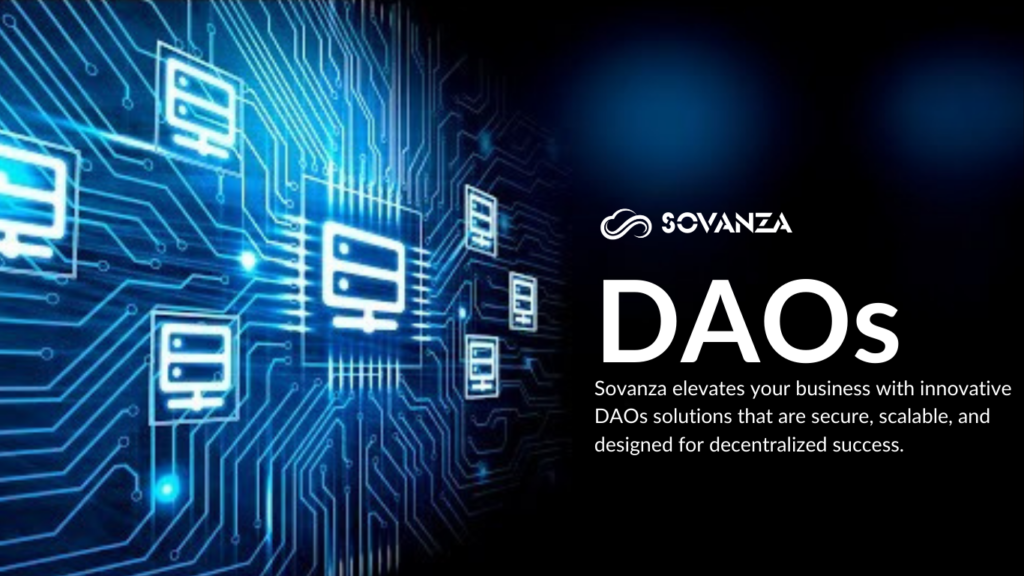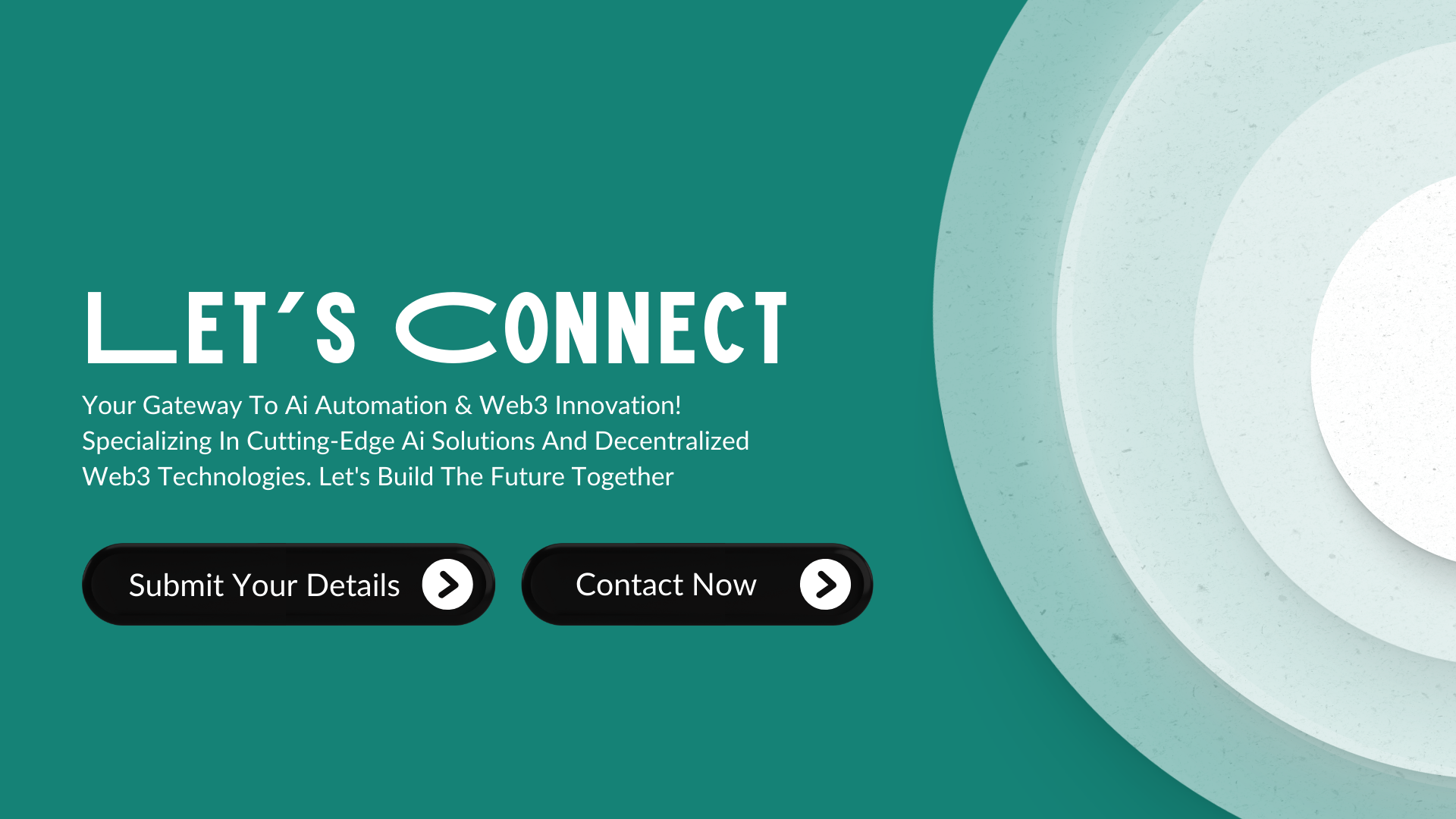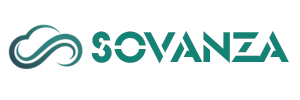
Introduction
DAOs (Decentralized Autonomous Organizations) are transforming the business and governance landscape by providing a transparent, decentralized, and community-focused method for decision-making. Unlike conventional organizations, DAOs function without a central governing body, using smart contracts and blockchain technology to automate and safeguard all facets of the organization’s activities. This framework enables members to engage directly in governance via voting, guaranteeing that choices embody the shared wishes of the community and presenting fresh chances for crowdfunding, innovation, and accountability in the digital era.
Sovanza is a reputable leader in DAO creation, offering companies the knowledge to develop, initiate, and grow decentralized organizations effectively. Focusing on innovation, customization, and scalability, Sovanza collaborates with companies to create DAOs that are efficient and secure and align with the advancing blockchain landscape. Our team collaborates closely with you to ensure your DAO flourishes, offering continuous support and advice during its entire lifecycle. Learn how our expertise in blockchain technology helps businesses build, scale, and maintain secure and innovative DAOs that drive success.
What is a DAOs?
A DAO (Decentralized Autonomous Organization) functions without a central authority and is regulated by rules embedded in smart contracts on a blockchain. Members participate in decision-making through voting, ensuring transparency, automation, and collective governance in every aspect of the organization’s operations.
How DAOs Work
DAOs depend on blockchain technology to store and verify transactions. Smart contracts and automated agreements recorded on the blockchain guarantee that the organization’s activities proceed efficiently without intermediaries. Every participant in the DAO usually possesses tokens, which enable them to vote on proposals, thus allowing the group to make choices.
Key Characteristics of DAOs
DAOs (Decentralized Autonomous Organizations) possess multiple distinct traits that differentiate them from traditional organizations.
- Decentralization: The DAO operates without a central authority, restoring power to the community and ensuring that decisions are made collectively and transparently without the influence of a single entity.
- Autonomy: DAOs utilize pre-coded smart contracts to make decisions according to established guidelines, allowing for self-execution of rules and eliminating the need for intermediaries or manual interventions.
- Transparency: Every action and transaction within a DAO is recorded on a blockchain, ensuring that all processes are visible and reachable to its members. It fosters confidence among the members.
- Token-based Governance: DAO members usually possess governance tokens that grant them voting rights regarding proposals and decisions, making them participants in shaping the organization’s direction.
How DAOs are Transforming the Business World in the USA
DAOs transform businesses by distributing decision-making authority. Unlike conventional companies with centralized control, DAOs empower token holders, fostering a more democratic and transparent governance model.
Crowdfunding & Tokenization
DAO uses token offerings and crowdfunding to offer companies innovative ways to gather funds, making investment opportunities more accessible and granting ownership shares to a broader range of people.
Innovation in Business Models
The decentralized structure of DAOs fosters experimentation with new business models, resulting in more innovative solutions that adapt to market changes.
Enhanced Responsibility
By empowering the community to make decisions and document actions on a transparent blockchain, DAOs promote increased accountability among all members, lowering the chances of corruption or unethical behavior.
Steps to Establish a Successful DAO
Establishing a DAO requires multiple essential steps, from clarifying its goals to implementing its governance framework. Here’s a streamlined procedure for establishing a DAO:
Defining Purpose and Governance
The initial step in creating a DAO is establishing its mission and goals. Determine the issue the DAO seeks to address and define the principles and objectives to steer its activities. This phase defines the DAO’sDAO’s emphasis, organization, and member involvement.
Choose a Blockchain Platform
The selection of blockchain is essential for the success of your DAO. You require a platform that enables smart contracts, offers scalability, and possesses robust security features. Sovanza can assist you in choosing the ideal blockchain for your requirements.
Developing Smart Contracts
Smart contracts serve as the foundation of your DAO. They automate choices, uphold regulations, and ease transactions. Sovanza collaborates with companies to develop tailored smart contracts that align with your organization’s objectives and principles.
Build a Community and Launch the DAO
Involve members who share the DAO’s vision, promote token ownership, and engage them in decision-making. When prepared, initiate the DAO and commence community-led decisions for development, guaranteeing enduring sustainability and cooperation.
Why Choose Sovanza for DAOs
As the world moves toward increasingly decentralized and transparent business structures, selecting the appropriate partner to assist you in implementing DAOs is essential. Sovanza excels in the USA as a frontrunner in DAO services, delivering specialized solutions that enable companies to harness the complete capabilities of blockchain technology.
Proven Expertise in DAO Development
Sovanza focuses on creating DAOs, providing extensive knowledge of the technical and strategic components needed to establish a decentralized organization. We assist you in maneuvering through the intricacies of DAO governance, smart contracts, and blockchain technology.
Scalable Solutions for Growth
Whether you begin modestly or pursue swift growth, Sovanza guarantees that your DAO is constructed on a scalable framework that can evolve with your requirements, supporting increasing members and enhancing features as time progresses.
Commitment to Innovation
At Sovanza, we are dedicated to keeping up with industry trends. We consistently incorporate new features and enhancements into your DAO, maintaining its competitiveness and adaptability within the changing blockchain landscape.
Sovanza’s Approach to Solving DAO Challenges
It offers great potential but comes with challenges. Sovanza helps businesses overcome these obstacles to leverage DAOs fully. Here’s how we address them:
Lack of Legal Frameworks
DAOs face uncertainty due to evolving legal regulations, particularly in the USA. At Sovanza, we ensure compliance with the latest laws and help structure your DAO to minimize legal risks and adapt to regulatory changes.
Governance Complexity
DAOs require a well-defined governance framework that balances equity, effectiveness, and openness. Sovanza creates strong governance frameworks with tailored voting mechanisms, promoting efficient decision-making, clarity, and equity.
Scalability Issues
As they expand, DAOs might face governance, operations, and technology challenges, resulting in inefficiency. Sovanza creates adaptable infrastructure to accommodate expansion and increased engagement, guaranteeing efficient operations without sacrificing performance.
Build Your Future DAO with Sovanza
Initiating your DAO with Sovanza is straightforward and effective. Our team works closely alongside you to grasp your vision and create a tailored solution that fits your objectives. From selecting the perfect blockchain platform to crafting secure smart contracts and tokenomics, we guarantee that your DAO operates smoothly and is prepared for lasting success. We also assist in creating and fostering an engaged community, ensuring your DAO develops naturally and flourishes. Prepared to create your DAO using Sovanza? Contact us now, and together, we can transform your concepts into a successful decentralized organization. We’re by your side throughout the process to guarantee the success of your DAO.
Conclusion
DAOs are reshaping business operations by decentralizing authority and promoting transparency, efficiency, and accountability in the decision-making process. By utilizing blockchain technology and smart contracts, DAOs remove the necessity for intermediaries and enable communities to govern collaboratively. As DAOs keep transforming the business landscape, they offer fresh opportunities for innovation, crowdfunding, and developing business models that align better with market demands. With their distributed framework, DAOs present a thrilling new realm in the digital era, stretching the limits of what can be achieved in governance and commerce.
Sovanza is leading this development, offering the knowledge, resources, and assistance organizations require to create and initiate thriving DAOs. Emphasizing customization, scalability, and continual innovation, Sovanza guarantees that your DAO is crafted to succeed in today’s rapidly changing blockchain environment. Whether you’re new to DAOs or seeking to improve an established one, Sovanza is dedicated to assisting you in navigating the intricacies and achieving your goals. Allow us to assist you in creating the future of decentralized organizations and realizing the complete potential of blockchain technology.
FAQs
What are decentralized autonomous organizations (DAOs)?
DAOs are decentralized entities that function through blockchain technology and smart contracts. They enable open, democratic decision-making without any central authority.
What advantages do DAOs provide for my business?
It offers enterprises advantages such as increased transparency, accountability, and community-driven decisions. They also encourage innovation, create new opportunities for crowdfunding and tokenization, and facilitate adaptable business models. The automation of smart contracts minimizes intermediaries, decreasing operational expenses.
What blockchain platforms does Sovanza recommend for DAOs?
Based on your project’s requirements, Sovanza suggests blockchain platforms such as Ethereum and Polkaproject’s Solana. We evaluate your objectives to assist you in selecting the most suitable platform for your DAO’s scalability, security, and smart contract functionality.
What function do tokens serve in a DAO?
Tokens play a vital role in DAOs by granting voting power and governance privileges. Members employ tokens to vote on proposals, decide outcomes, and shape the DAO’s path. These tokens enable involvement in decisions about the DAO’s development, financing, and governance strategies.
Are DAOs secure?
Due to blockchain technology and smart contracts, DAOs are very secure. Safety is a collective obligation. Sovanza helps you adopt optimal methods for smart contract creation and blockchain protection, securing your DAO from possible weaknesses and threats.

